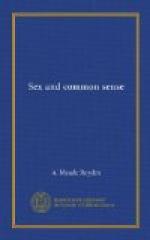Is passion a cause or an effect? In other words, should physical union be the expression of spiritual union? Is it the “outward and visible sign of an inward and spiritual grace?” Or is it a means by which that grace is achieved? I think the first instinct of most women would be to say that spiritual union should be expressed by physical union, and that unless this spiritual union exists the physical union is “wrong.” And yet everyone who stops to think will admit that the expression of an emotion deepens it. One can “work oneself up into a rage” by shouting and swearing. One can deepen love by expressing love. It is noticeable that the whole case for birth control has repeatedly been argued from the ground that the act of physical union not only expresses but intensifies and increases love.
Marriage is the most difficult of human relations, because it is the most intimate and the most permanent. To live so close to another—who, in spite of all, remains another—to be brought so near, to associate so intimately with another personality, without jarring or wounding—that is hard. No wonder it is not invariably a success! But passion makes it possible to many to whom, without this, it would not be possible. Ultimately passion should be transcended since in any case it must be left behind. Yet it has served its end, in deepening and intensifying the love of two people for one another.
Where then lies the difficulty, since probably men and women alike would agree that what I have said is true?
The difference of view is perhaps more in practice than in theory; yet it is all the harder of adjustment for that. In theory, both men and women would agree that physical union, ideally, should express a spiritual union; and that in doing so, it deepens and intensifies it. But it is still possible to disagree as to which of these two aspects of an admitted truth is the more vital and fundamental.
It may be, as I have already suggested, that the woman’s point of view is due to her physiology; or it may at least be influenced by it. At least, I am convinced that to the woman the sense that physical union is only justified by already existent spiritual union, is the normal one. I believe that, however incapable she may be of explaining it, and however her power of reasoning may be vitiated by wrong ideas about the sexual relation, she does instinctively recoil from its use when its reason for existence is not there. She may attribute her reluctance to the fact that she is too womanly (sic), too spiritually minded to have any desire for sexual relations at all; her husband may attribute it to coldness of temperament or “modesty.” In fact, it is due to the cause I have stated, and if she had never been called upon to give her body except when her own desire for the “outward and visible sign” of an “inward and spiritual grace” demanded it, her husband would have found that she was not temperamentally defective, but as good a lover as he.




